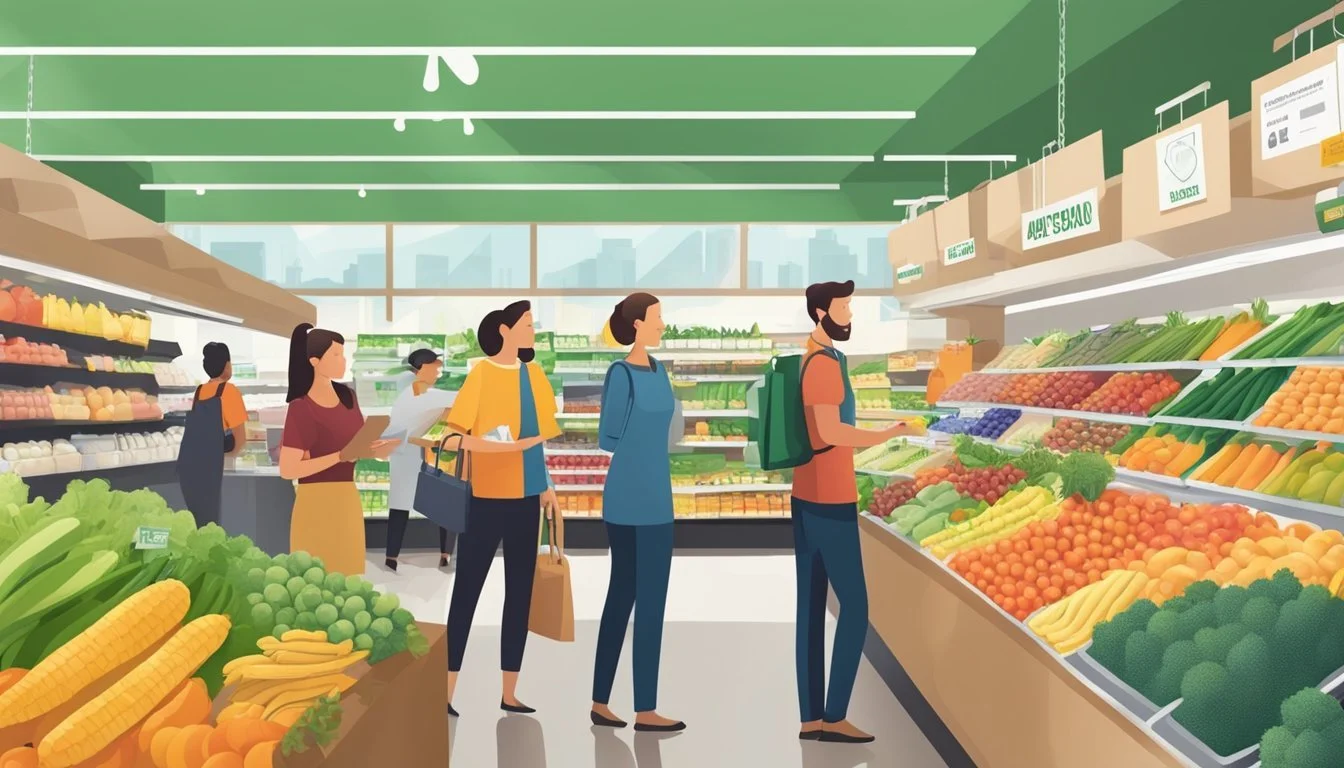Ingles Markets vs Piggly Wiggly
A Comprehensive Comparison of Prices, Selection, and Service
Grocery shopping is a routine task for many households, and the choice of store can significantly impact both budget and satisfaction. Ingles Markets and Piggly Wiggly are two well-known grocery chains in the southeastern United States, each with its own unique offerings and history.
Ingles Markets, founded in 1963, has grown to operate over 200 stores across six states. The chain is known for its focus on fresh produce, in-store bakeries, and competitive pricing. Piggly Wiggly, established in 1916, holds the distinction of being America's first true self-service grocery store. It revolutionized the industry by allowing customers to select their own goods from shelves.
While both stores have their strengths, Ingles Markets generally offers a more modern shopping experience with a wider selection of products, making it the better choice for most consumers. However, Piggly Wiggly's historic significance and local charm continue to appeal to many shoppers, particularly in smaller communities where personal service is highly valued.
Grocery Store Overview
Piggly Wiggly and Ingles Markets have both played significant roles in shaping the American supermarket landscape. Their unique histories and approaches to grocery retail have left lasting impacts on the industry.
Historical Significance of Piggly Wiggly
Piggly Wiggly revolutionized grocery shopping when it opened its first store in Memphis, Tennessee in 1916. It introduced the concept of self-service, allowing customers to select their own items from shelves.
This innovation drastically changed how people shopped for food. Piggly Wiggly pioneered features like checkout stands, individually priced items, and shopping baskets.
The chain's influence spread rapidly across the Southern and Midwestern United States. By the 1930s, Piggly Wiggly had become a household name and a model for modern supermarkets.
Ingles Markets: From Inception to Expansion
Ingles Markets began its journey in 1963 when Robert Ingle opened his first grocery store in Asheville, North Carolina. The company focused on providing fresh, high-quality products at competitive prices.
Ingles expanded steadily throughout the Southeastern United States. It differentiated itself by emphasizing customer service and adapting to local preferences.
The chain grew to include hundreds of stores across six states. Ingles Markets also developed its own distribution network and manufacturing facilities to support its growth.
Supermarket Chain Landscape
The supermarket industry has evolved significantly since Piggly Wiggly's early innovations. Regional chains like Ingles Markets now compete with national and international corporations.
Supermarket chains face challenges such as:
Intense price competition
Changing consumer preferences
The rise of online grocery shopping
Many regional stores have maintained loyal customer bases by focusing on:
Local products
Personalized service
Community involvement
The grocery landscape continues to shift as chains adapt to new technologies and shopping habits.
Location and Accessibility
Ingles Markets and Piggly Wiggly have distinct geographic footprints and expansion strategies that shape their accessibility to customers. Their presence in different regions influences their market reach and community involvement.
Presence in Tennessee and the Midwest
Ingles Markets maintains a strong presence in Tennessee, particularly in the eastern part of the state. The company operates several stores in key cities and towns, providing convenient access for local shoppers. In contrast, Piggly Wiggly's presence in Tennessee is more limited, with fewer locations compared to Ingles.
Ingles has not significantly expanded into the Midwest region. The company's focus remains primarily on the southeastern United States.
South-Eastern Dominance of Piggly Wiggly
Piggly Wiggly has a dominant presence in the southeastern United States. The chain originated in Memphis, Tennessee, and has since expanded across several southern states. Alabama hosts numerous Piggly Wiggly stores, making it a familiar sight for shoppers in the region.
Piggly Wiggly's strong southern roots contribute to its popularity in smaller towns and rural areas. The chain's franchise model allows for local ownership, fostering a sense of community connection.
Expansion Strategies and Community Involvement
Ingles Markets adopts a focused expansion strategy, concentrating on strengthening its presence in existing markets rather than rapid geographic expansion. This approach allows the company to build strong ties with local communities and tailor its offerings to regional preferences.
Piggly Wiggly's expansion relies heavily on its franchise model. This strategy enables local entrepreneurs to open stores under the Piggly Wiggly brand, adapting to specific community needs.
Both chains emphasize community involvement, but their approaches differ. Ingles often participates in local events and sponsors community initiatives in areas where it has a strong presence. Piggly Wiggly's community engagement varies by location due to its franchise structure, with individual store owners often taking the lead in local initiatives.
Product Range and Quality
Ingles Markets and Piggly Wiggly offer distinct shopping experiences with varied product ranges and quality standards. Each store caters to different customer preferences through their selection of fresh produce, meats, bakery items, and prepared foods.
Produce, Meat, and Bakery Comparisons
Ingles Markets prides itself on a wide selection of fresh produce, featuring both conventional and organic options. Their produce department often includes local seasonal fruits and vegetables. The meat counter at Ingles offers a variety of cuts, including USDA Choice beef and fresh poultry.
Piggly Wiggly's produce section, while smaller, focuses on staple fruits and vegetables at competitive prices. Their meat department emphasizes value, with regular specials on family-sized packs.
Both stores maintain in-house bakeries. Ingles offers a broader range of artisanal breads and custom cakes. Piggly Wiggly's bakery provides classic items like donuts and sandwich breads.
Organic and Locally-Sourced Selection
Ingles Markets has expanded its organic offerings significantly in recent years. They feature a dedicated organic produce section and carry organic options across various departments. The store actively partners with local farmers to stock regionally-grown produce and products.
Piggly Wiggly's organic selection is more limited but growing. They focus on popular organic items like milk, eggs, and select produce. Local sourcing varies by location, with some stores featuring regional specialties.
Store-Prepared Foods and Deli Services
Ingles Markets excels in store-prepared foods. Their deli offers a range of hot and cold options, including rotisserie chickens, salad bars, and made-to-order sandwiches. Many locations feature sushi stations and in-store cafes.
Piggly Wiggly's deli services are more traditional. They provide standard deli meats and cheeses, along with basic prepared foods like fried chicken and potato salad. Some locations offer hot food bars with Southern-style dishes.
Both stores stock a variety of pantry staples and general merchandise. Ingles typically offers a larger selection of specialty and gourmet items, while Piggly Wiggly focuses on everyday essentials at value prices.
Pricing and Value for Money
Ingles Markets and Piggly Wiggly both strive to offer competitive pricing and value to their customers. Their approaches to pricing, promotions, and loyalty programs shape the overall shopping experience and potential savings for consumers.
Competitive Pricing Analysis
Ingles Markets generally maintains mid-range prices, positioning itself between budget and premium grocery stores. They often match competitors' prices on key items to stay competitive. Piggly Wiggly, known for its cost-effective pricing model, typically offers lower prices on many everyday essentials.
A comparison of common grocery items reveals that Piggly Wiggly tends to have an edge in affordability. For instance, staples like milk, bread, and eggs are usually priced lower at Piggly Wiggly compared to Ingles Markets.
However, Ingles Markets often provides better value on premium and specialty products. Their wider selection of organic and gourmet items may be priced more competitively than similar offerings at Piggly Wiggly.
Discounts and Promotions
Both chains employ various promotional strategies to attract customers and provide additional value. Ingles Markets frequently runs "10 for $10" deals on select items, allowing customers to mix and match products. They also offer weekly specials on fresh produce and meat.
Piggly Wiggly is known for its "Pig of the Week" promotions, featuring significant discounts on specific items. The chain also provides "buy one, get one free" deals on various products throughout the store.
Seasonal sales are common at both retailers. Ingles Markets often has holiday-themed promotions, while Piggly Wiggly tends to focus on local events and community-specific deals.
Both stores use circular ads to promote their weekly specials, but Ingles Markets typically offers a wider variety of discounted items in their ads.
Loyalty Programs and Digital Coupons
Ingles Markets' Advantage Card program provides personalized savings and fuel discounts based on shopping habits. Cardholders can load digital coupons directly to their account for easy redemption at checkout.
Piggly Wiggly's loyalty program varies by location, as many stores are independently owned. Some offer punch cards for specific departments, while others provide general store discounts for frequent shoppers.
Both chains have embraced digital coupons, allowing customers to browse and clip offers on their websites or mobile apps. Ingles Markets tends to offer a larger selection of digital coupons, including manufacturer and store-specific deals.
Piggly Wiggly's digital coupon offerings are more limited but often include higher-value discounts on everyday essentials. Some Piggly Wiggly locations also accept paper coupons, providing additional savings opportunities for traditional coupon clippers.
Shopping Experience and Convenience
Ingles Markets and Piggly Wiggly offer distinct shopping experiences that cater to different customer preferences. Both chains prioritize convenience but implement it in unique ways.
Store Layout and Environment
Ingles Markets typically features spacious layouts with wide aisles, making navigation easier for shoppers with carts. The stores often have a modern, clean aesthetic with bright lighting. Departments are clearly labeled, and product categories are logically organized.
Piggly Wiggly stores tend to have a more compact layout, which can be advantageous for quick shopping trips. The smaller footprint creates a cozy, neighborhood feel. Some customers appreciate the familiarity and ease of finding items in a smaller space.
Both chains stock a diverse selection of products, but Ingles often carries a wider variety of specialty and organic items. Piggly Wiggly focuses on providing essential groceries and local favorites.
Checkout Lines and Payment Technology
Ingles Markets has invested in modernizing its checkout process. Many locations offer self-checkout options alongside traditional cashier lanes. The chain has embraced digital payment methods, including mobile wallets and contactless cards.
Piggly Wiggly stores vary in their checkout technology. Some locations have updated their systems to include self-checkout kiosks, while others maintain a more traditional approach with cashier-operated registers. Payment options may be more limited at some Piggly Wiggly stores.
Both chains strive to keep checkout lines moving efficiently, but wait times can vary depending on location and time of day.
Customer Service Excellence
Ingles Markets emphasizes employee training to ensure high standards of customer service. Staff members are typically knowledgeable about product locations and can assist with special requests. The chain often provides dedicated customer service desks for returns, refunds, and inquiries.
Piggly Wiggly stores are known for their friendly, personalized service. The smaller store size allows employees to develop familiarity with regular customers. This can lead to a more intimate shopping experience where staff members may remember shoppers' preferences.
Both chains prioritize customer satisfaction, but their approaches differ. Ingles focuses on professional, efficient service, while Piggly Wiggly aims for a more personalized, community-oriented experience.
Cleanliness and Store Maintenance
Cleanliness and store maintenance play crucial roles in the shopping experience at Ingles Markets and Piggly Wiggly. Both chains strive to maintain clean and well-kept stores, but there are some differences in their approaches.
Ingles Markets often employs a dedicated cleaning staff to ensure their stores remain tidy throughout the day. They typically use commercial-grade cleaning supplies to maintain hygiene standards in high-traffic areas like produce sections and checkout counters.
Piggly Wiggly stores, being independently owned and operated, may have varying levels of cleanliness depending on the specific location. Some Piggly Wiggly stores pride themselves on their spotless aisles and well-organized shelves.
Both chains generally keep cleaning supplies readily available for immediate use in case of spills or accidents. This helps maintain a safe shopping environment for customers.
Store maintenance is another area where these grocers differ. Ingles Markets tends to have more modern facilities with regular updates to lighting, flooring, and refrigeration units. This proactive approach helps prevent equipment breakdowns and enhances the overall shopping experience.
Piggly Wiggly stores, due to their independent nature, may have more varied maintenance practices. Some locations invest heavily in upkeep, while others may show signs of wear and tear.
Ultimately, cleanliness and maintenance can vary between individual store locations for both chains. Shoppers are encouraged to visit their local Ingles Markets and Piggly Wiggly stores to assess these factors firsthand.
Brand and Consumer Perception
Brand reputation and consumer perception play crucial roles in determining the success of grocery stores. Both Ingles Markets and Piggly Wiggly have established unique identities in the competitive supermarket landscape.
Consumer Reports and Survey Outcomes
Consumer Reports rankings provide valuable insights into grocery store performance. While specific rankings for Ingles Markets and Piggly Wiggly are not readily available, industry surveys often evaluate factors such as product quality, pricing, and customer service.
Regional grocery chains like Ingles and Piggly Wiggly typically score well in areas of local product selection and community engagement. These stores often cultivate loyal customer bases in their operating regions.
National surveys frequently assess customer satisfaction across various metrics. Shoppers prioritize factors such as cleanliness, checkout speed, and price competitiveness when rating their grocery experiences.
Store Brand vs. National Brands
Both Ingles Markets and Piggly Wiggly offer a mix of national brands and their own store brands. Store brands, also known as private labels, have gained popularity among budget-conscious shoppers.
Ingles Markets features its "Laura Lynn" brand, which spans a wide range of products from dairy to snacks. Piggly Wiggly offers its own line of store brand items, providing value alternatives to national brands.
Quality perceptions of store brands can significantly impact overall consumer perception. Many shoppers now view store brands as comparable to national brands in terms of quality and value.
Customer Satisfaction and Preferences
Customer satisfaction often hinges on a store's ability to meet specific shopper preferences. Ingles Markets and Piggly Wiggly each cater to distinct customer segments.
Ingles Markets tends to focus on fresh produce and local products, appealing to health-conscious consumers and those who prioritize supporting local farmers. Their stores often feature in-house bakeries and delis.
Piggly Wiggly, known for its historical significance as a pioneer of self-service shopping, maintains a reputation for convenience and competitive pricing. Many shoppers appreciate its no-frills approach and neighborhood store feel.
Both chains emphasize customer service as a key differentiator in the competitive grocery landscape. Regular shoppers often develop strong loyalty to their preferred store based on consistent positive experiences.
Corporate Responsibility and Local Impact
Ingles Markets and Piggly Wiggly demonstrate commitment to their communities through various initiatives and local partnerships. Both chains prioritize sustainability and support for regional producers, though their approaches and scale differ.
Sustainability Initiatives
Ingles Markets has implemented energy-efficient technologies in its stores, including LED lighting and improved refrigeration systems. The company has also increased recycling efforts and reduced packaging waste. Piggly Wiggly stores, being independently owned, have varying sustainability practices. Some locations have adopted energy-saving measures and participate in local recycling programs. Both chains have taken steps to minimize food waste by donating unsold, edible items to local food banks and charities.
Support for Local Produce and Artisanal Products
Ingles Markets operates its own dairy and bakery facilities, ensuring freshness and supporting local jobs. The chain partners with regional farmers to stock locally grown produce and showcases artisanal products from small businesses. Piggly Wiggly stores, deeply rooted in their communities, often feature products from nearby farms and food artisans. This emphasis on local sourcing provides customers with fresh, seasonal options while boosting the local economy. Both chains organize events and promotions to highlight regional specialties and support community producers.







